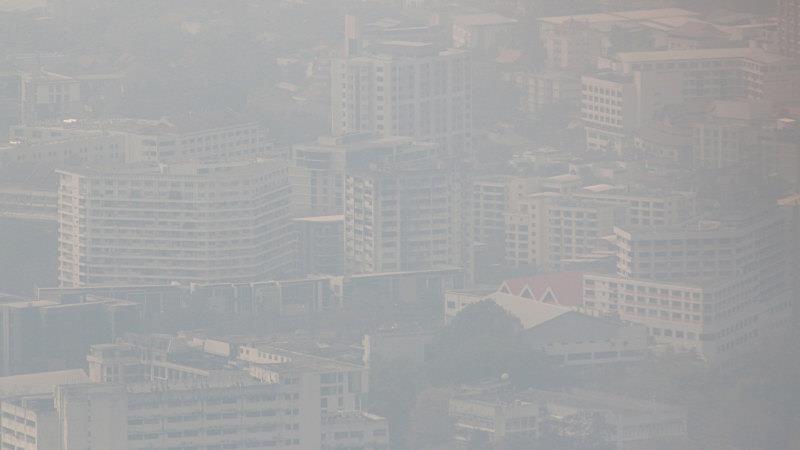Singapore: From their home in Chiang Mai, Am and Steve Sandford used to have their own unscientific but effective gauge of smoke levels during the height of Thailand’s dry season.
“From our house we could see Doi Suthep temple,” said Am, referring to the famous mountain-top attraction just outside the northern city.
Tourists look out over the dense haze covering Chiang Mai.Credit:Getty Images
“What we’d do to measure the pollution is look to the mountain and if we didn’t see it we knew ‘today is very bad’. It became our symbol to measure the pollution.”
Thailand is accustomed to haze in the skies thickening between January and April each year as farmers burn their crop waste and forest fires rise in frequency, but this year has been particularly bad.
Over the weekend, in fact, Chiang Mai was rated as the most heavily polluted city in the world over a 24-hour period for two days in a row, exceeding the likes of Delhi, Lahore and Dhaka on air quality monitor IQAir’s real-time index of 100 major centres around the globe.
Further west in Mae Hong Son, near the border with Myanmar, the concentration of PM2.5, dangerous fine particles that can infiltrate the lungs and bloodstream, was 20 times the World Health Organisation’s guidelines.
Chiang Mai residents experienced the world’s worst air pollution over the weekend.Credit:Getty Images
The capital Bangkok has also been enveloped in recent weeks, with conditions so serious that officials have advised pregnant women, children and the elderly to remain indoors and others to reduce activities outside.
Last week alone, 200,000 people across the country sought medical treatment for illnesses related to the air pollution and more than 1 million have been affected this year, according to Opas Karnkawinpong, a permanent secretary with the Health Ministry.
The government last month imposed a ban on agricultural burning off until the end of April, warning those who breached the rules would be face penalties.
“Please, I don’t want to use the laws,” said Prime Minister Prayut Chan-o-cha last week. “I don’t want anyone to be in trouble but you must think about the quality of life of others and their health too,” he said.
Am Sandford, third from left, with, from left, brother Aun, husband Steve, daughter Charli and parents Sanae and Nim. Nim passed away in January.
In the tourist hub of Chiang Mai, where the burning of farming fields across the border in Myanmar also contributes to the problem, masks have been handed out and air purifiers, a fixture in the households of those who can afford them, have been in overdrive.
The Sandfords were among the first in their village to buy one and convinced their family members to do the same. But when their then five-year-old daughter Charli began coughing and had to be taken to hospital in 2009, they began migrating to southern Krabi during the smoke season, which usually subsides around the time of the Songkran water festival in mid-April.
Four years ago, they packed up and moved from Chiang Mai to Krabi permanently.
Wealthy residents and those in Chiang Mai’s middle class also regularly arrange holidays away from the area during the worst of the smoky season but it is an option not available to everyone.
College students work near air purifiers used to reduce air pollution at Chiang Mai University last week.Credit:Getty
“The poor people, they are aware of the problem but they have no choice, they have to work, they can’t leave,” Am said. “They [practise] harm reduction by closing their windows, not exercising outdoors.”
The consequences can be deadly. According to a study of disease trends between 1993 and 2017 by the Lampang Cancer Hospital, reported by the Bangkok Post, the rate of lung cancer in the north of Thailand – where burning of residue from rice and sugarcane harvests is most prevalent – was higher than the national average. The data is reflected in Chiang Mai being home to a large cancer hospital.
The Sandfords know the risks as well as anyone. In January, Am’s father Nim Khampeera, a farmer in the Chiang Mai area who had never smoked, died of lung cancer at the age of 71.
Her mother Sanae Khampeera still lives there.
“Before you called me, my mum called me from home. She told me ‘the air cleaner that you got for us, I turned it now on and it’s gone red’,” Am said.
“I said ‘yes, it’s because the air is very bad, Mum … keep using it and don’t leave the house’.”
Get a note directly from our foreign correspondents on what’s making headlines around the world. Sign up for the weekly What in the World newsletter here.
Most Viewed in World
From our partners
Source: Read Full Article




